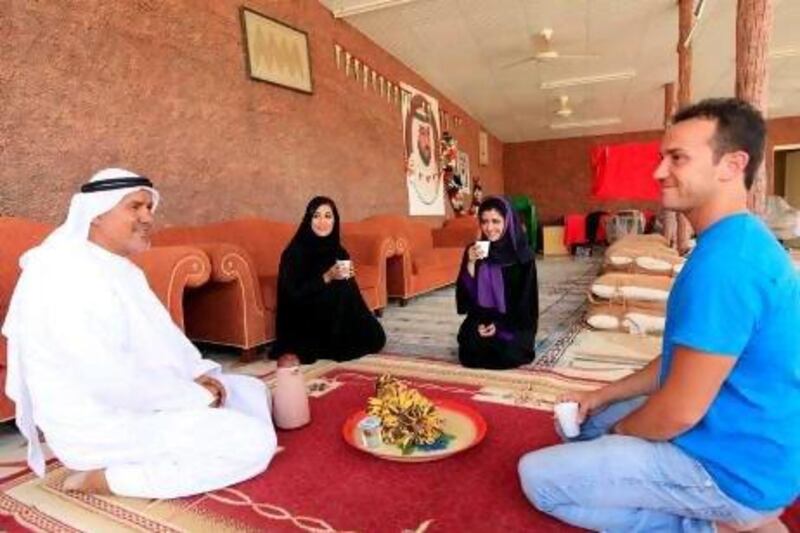DUBAI // Michele Cece was not that impressed by the Burj Khalifa, the World Islands or the Yas Marina F1 circuit. But a drive to the northern village of Masafi, two hours from Dubai, so affected the Italian that he decided to move to the UAE for good.
"Everything I saw in Dubai as a tourist was artificial," said Mr Cece. "It has undergone an impressive development but when I come to a country I like to see what it is made of. I had not seen many Emiratis and I did not understand the history behind their culture."
Mr Cece had visited the UAE before his trip to Masafi.
"My brother lives here and so I came before to visit him," he said.
While Cece was spending his first two holidays in air-conditioned shopping malls and signing up for desert safaris operated by tour companies, the Emirati entrepreneurs Muna Harib and Nojoud Al Bastaki were trying to find a way to connect visitors with the real UAE culture.
"Many tourists who come to Dubai say that the only Emirati they meet is the person stamping their passports at the airport," said Ms Harib.
"We developed a concept to connect the tourism industry with low-income Emirati families in a way that will directly generate revenue for the families from tourism," said Ms Al Bastaki.
They call their project Buksha, an Arabic word for a walking stick, and they intend to offer tourists a taste of authentic Emirati culture by arranging for them to stay with local families and eat their food.
"If a person comes to Dubai or Abu Dhabi as a tourist, they will spend on a hotel, a safari and other tourist activities. What we are trying to set up is allowing the tourists to spend that money on low-income families so they can really experience the Emirati culture," said Ms Harib.
The final concept, says Lina Hourani, the corporate social responsibility (CSR) director at Al Ahli group, was developed during a CSR in Action workshop last November.
"We trained 25 Emiratis from various sectors on the fundamentals of corporate social responsibility for 10 days and gave them the task of implementing micro projects," she said.
Buksha was awarded with top honours and the two women will travel to the United States in August to visit Microsoft and learn about the best CSR practices in America.
Mr Cece was one of the first to be exposed to UAE culture through the Buksha programme.
"In our pilot programme, we took a tour group of eight people to a mountaintop farm and house in Masafi," Ms Harib said.
The retired military officer Ali Khamis Al Mehrizi, known to the locals as Bu Mohammed, opened his home to the women and their tourists.
"We were driving around the area and spotted Bu Mohammed's house in Masafi and we went in and looked around. He came to us and was very welcoming and agreed to our idea," said Ms Al Bastaki.
Bu Mohammed's house, which overlooks the village of Masafi from atop a mountain, consists of a guesthouse and a majlis where the tourist group stayed and slept.
"After spending a weekend as a guest of Bu Mohammed, eating with him and hearing his stories, we visited two local weddings," said Mr Cece.
"I never had any interest in the Arabian culture until I heard the stories Bu Mohammed had told us and I was taken aback by the culture and heritage. I am so impressed with the culture I am now learning Arabic".
Bu Mohammed explained why an area like Masafi needs such an initiative.
"When these two girls came to me and told me their idea I thought it was invaluable," he said. "This area is conservative and needs this kind of work. Women here sometimes cover their heads when they see a man on television," he said.
Ms Harib and Ms Al Bastaki have been in contact with the Ministry of Social Affairs to take their programme forward.
"We have been provided with a list of more than 10 families in the northern emirates picked by the ministry to be part of our programme," Ms Al Bastaki said.
"We are currently setting up to register a licence."






